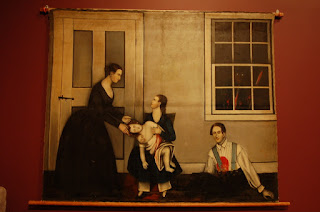ALL IN THE FAMILY
“William’s aunt was raving crazy but she never hurt anyone. She got well before she died. Sidney Freeman [Bill’s uncle] got crazy in prison. He never hurt anyone; neither of them ever stole anything when crazy. Sidney was in prison for stealing. It is said he was put in wrongfully.”- Sally Freeman (Bill’s mother)
When a Monticello jury found C.W. Hardenbergh, guilty of murder in 1842, the defense appealed, citing “traditionary insanity,” or one’s “crazy ancestors” as explanation and viable proof of the legal insanity of the accused. It didn’t work with C. W. Hardenbergh; but that didn’t mean it wouldn’t work with William Freeman. Seward pointed out that William Freeman’s own mother had admitted under oath that many of her relations had their battles with the mind.
Atty. Gen. Willis Hall had done his homework in Monticello (which ever John Van Buren sat at the defense table) and Seward benefitted. Seward would leave no stone unturned in Auburn; referencing “tiger hunters” or “monomaniacs” in the family tree. As his lawyers laid out his case, Bill just grinned mindlessly; rocking back and forth in his chair.
Benjamin Van Keruen (hame shop foreman) sworn
By WH Seward:
Q. Did you not say he ought to be hung or words to that effect?
A. I was up at the house when the vote was taken to hang him, and I presume I said something. I think very likely I said he ought to be lynched.
Q. What were you there for?
A. I went up there, with others to see the dead bodies.
Q. Were you excited at seeing the dead bodies.
A. I probably was. They were among the most respectable people in the county.
Q. When you said he ought to be lynched did you think that the prisoner could not be brought to punishment in the ordinary way?
- I did.
As Henry Seward was trying to convince a jury that William Freeman was insane by virtue of family ancestry, John Van Buren was attacking the defense. There was no question as to which John Van Buren was in Auburn. Just nine years old when his father convicted and executed Henry’s cousin James Teed for the murder of his uncle, propelling the elder Van Buren to national prominence, John remembered it well. His father had gone on to be elected New York governor, vice president and the eighth president of the United States. John Van Buren would go no further than being appointed New York Attorney General. Although an influential, behind the scenes Democrat powerbroker, Van Buren would never attain high elected office. His victories and defeats would all be in court and backrooms.
Henry Seward had spent his career opposing the elder Martin Van Buren and now faced the very capable son. The younger Van Buren had successfully prosecuted the leader of the Calico Indian anti-rent insurgency, Doctor Boughton, the Osterhouts (Elias and Cornelius) and the rest of the down-rent leadership in the Delhi anti-rent trials. Seward had no love for father or son. Van Buren completely opposed the Hardenbergh position in the Freeman trial, declaring that not guilty by reason of insanity as a defense, was ludicrous; insisting it left society vulnerable and unprotected by the courts. A parade of witnesses for the prosecution backed up the young Atty. Gen.’s reasoning, that an insanity defense was untenable. This may (or may not) give credence to Hardenbergh’s lawyer being the “other” John Van Buren. It’s a moot point.
Henry Seward once again put the Auburn System on trial. In Seward’s reasoning both his clients, Wyatt and Freeman, were the real victims. They had killed only because the system ruptured, turning them into crazed killers. Left to their own devices, neither was a danger to society. At least with Bill Freeman, Seward was correct.
“I never knew a madman who did not know right or wrong on some subjects.” Dr. Charles B. Coventry proclaimed from the stand. “The moral maniac usually commits his crimes without accomplishes. He sometimes premeditates the crime; sometimes not. The moral maniac who commits a homicide, is prone to suicide. They exist so intimately that one can hardly exist without the other.”
Another Auburn lawyer by the name of Daniel Arbus, who had hired William Freeman, as a boy, to chop wood and plow his garden, added his voice to the mix:
“During the trial of Henry Wyatt for murder, I saw him [Freeman] in the courthouse several times. Sometimes he was in one part of the house and sometimes in another. I saw him here several days. He was a pretty hard boy. I see no difference in him only in his size and deafness. He carries his head on one side. I see no difference in his eye. I have not seen anything in him to induce me to believe he is insane.”
Putting aside the Van Nest murders, there was nothing in William Freeman’s appearance or actions to indicate insanity. The deafness, an ever present dulled, quizzical look, allowed the busy town to navigate around Bill like he was a snagged deadfall in the river. Those sharp branches were of no danger—until Bill’s fragile moorings gave way.

Comments
Post a Comment